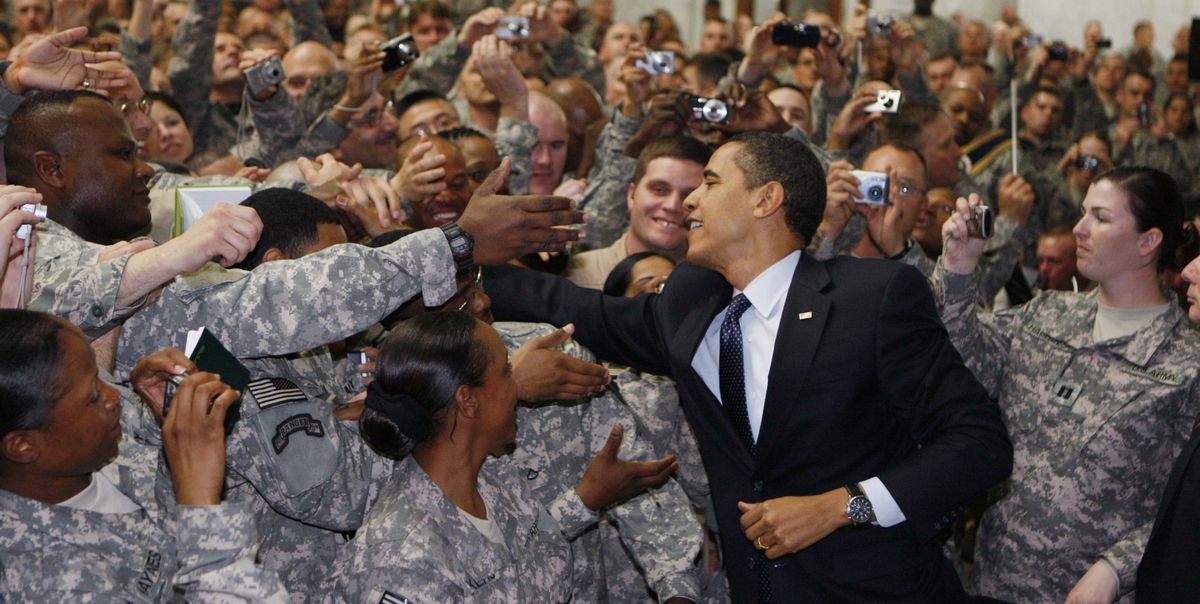Obama packs his first 100 days with action at home and abroad

WASHINGTON – President Barack Obama’s first 100 days on the job exploded with activity on many fronts: the $787 billion economic stimulus, the order to close the Guantanamo Bay prison within a year, a withdrawal plan for Iraq, an expansion of U.S. forces in Afghanistan and outreach to several hostile nations.
Still, America’s economic crisis largely shaped these 100 days. It also empowered Obama, even as it overshadowed some of what he’d hoped to do.
“The ability to enlarge executive power is a function of crisis,” said Ross K. Baker, a Rutgers University political scientist. He’ll help lead a national conference next month on Obama’s first 100 days – today marks the 100th – a traditional measure for new presidents since Franklin D. Roosevelt’s ambitious new administration in 1933.
Obama has benefited from “a double lift-off,” Baker said, “not only the normal honeymoon but, in addition, the fact that the American people and Congress are looking to him to get them out of a crisis.”
Whether the new president will succeed at that, of course, remains to be seen.
Despite his talk of bringing spending under control, the nonpartisan Congressional Budget Office projects that Obama’s $3.6 trillion budget will drive the deficit to a record $1.8 trillion this year and double the national debt over the next decade.
Meanwhile, some of Obama’s initial steps on the foreign stage have raised eyebrows. On Afghanistan and Pakistan, even some of his own top officials concede that the administration’s strategy has little chance of halting the advance of Islamic extremism in Pakistan or crushing the Taliban and al-Qaida in Afghanistan.
It also isn’t clear whether Obama’s overtures to Iran, Venezuela, Cuba and North Korea, while demonstrating his preference for cooperation over confrontation, will produce diplomatic breakthroughs or be interpreted as weakness by those countries’ leaders.
Much of what American presidents accomplish begins in their first 100 days. Just as the Great Depression allowed Roosevelt to quickly lay the groundwork for the New Deal, Obama seized on today’s crisis to frame an ambitious agenda.
He got both chambers of Congress to pass sweeping $3.6 trillion budget plans largely on his terms. His $787 billion stimulus package included tax breaks he wanted and spending on his priorities, including expansions of health care, infrastructure, renewable energy and education. He’s also announced a $275 billion plan to stave off home foreclosures and a $100 billion bank rescue program.
He forced out the chief executive of General Motors, told the company to consider bankruptcy and is pushing Chrysler to merge with a more stable automaker.
Obama has signed more executive orders, memoranda and proclamations in his first 100 days than any president since Franklin Roosevelt. One notable order lifted former President George W. Bush’s restrictions on federal funding for human embryonic stem cell research.
Obama also spent more of those first months outside the country than any of his predecessors, according to the American Presidency Project.
So far, a majority of Americans like what they see.
Obama’s average approval rating for his first three months in office was 63 percent in the Gallup Poll.
That’s the highest since Jimmy Carter’s 69 percent rating after his first 100 days more than three decades ago. However, Carter’s presidency is widely considered a failure, which underscores the risk of reading too much into a president’s first 100 days.
Obama also opened a new era of relations with Congress, moving quickly to enact legislation that Democrats couldn’t get past Bush: expanded children’s health insurance coverage (paid for with higher cigarette taxes) and pay-equity legislation giving women more grounds for lawsuits. He also delivered a signature expansion of national service programs in the tradition of Democratic presidents John F. Kennedy and Bill Clinton.
Obama signed orders to expand access to information under Freedom of Information and Presidential Records laws. But while making good on his promise to make government more transparent, Obama’s White House nonetheless tries to shape the media message by limiting access to much information via selective leaks by unnamed sources.
The president also has begun laying the groundwork for sweeping health care and global warming legislation. He says he’ll preserve private health insurance but offer more government-managed insurance so that everyone is covered. Critics think that will guarantee significant tax increases down the road, despite the president’s promise to raise taxes on only the wealthiest Americans.
His health care overhaul is far from assured of passage, as is his plan to curb greenhouse gases. Both face epic struggles in Congress.
Turning to national security, Obama ordered the closure of secret CIA prisons overseas and of the detention facility at Guantanamo Bay, Cuba, within a year. He rescinded the Bush administration’s authorization of harsh interrogation techniques, and he made public four previously secret Bush-era memos that described those methods in detail.
At the same time, he told CIA officials who followed the Bush guidelines that they won’t be prosecuted and invoked the same state secrets privilege that he’d criticized Bush for abusing to shield other details about spying and anti-terrorism programs. Both moves have frustrated some of his liberal backers.
Obama then waffled on his no-prosecution pledge last week, saying that the decision of whether to prosecute Bush administration officials who authorized the harsh techniques will be up to Attorney General Eric Holder.
The new president has brought a warm new tone to global diplomacy. He sought to recast relations with the Muslim world, including his video overture to Iran for new diplomatic relations. He relaxed Cuba policy, opening what some see as a window toward lifting the almost 50-year-old trade embargo. He was all smiles when shaking hands recently with Venezuela’s President Hugo Chavez, a leftist who once denounced Bush at the United Nations as “the devil.”